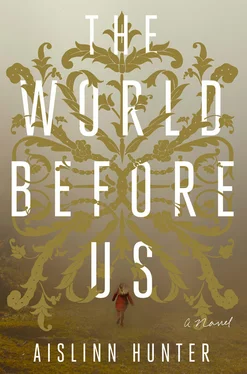If Thorpe had asked Herschel what he remembered about that day in the woods, and if Herschel could have voiced it, he might have said the cast light of the forest, the sun broken by branches as if by the struts of a window, the dew palpable and settling. The poet’s words covered everything he saw like a gauzy web: recitations netted over the spindling trees, crawling over the thick veins of the leaves like a caterpillar. Caught in gusted exaltation! / Tooth-tipped we slip / under the grazed skin of the mottling ground . The green noise of the poems and the woods surrounded Herschel: leaf-mouths and nattering grasses, the low hum of the pan of moss he put his ear against. The throstle in the forest understorey saying hello in its tweep and burble ; the poet singing, Come under, come under and know you are not alone .
In the latter part of the day, Leeson and the girl started to trail Herschel at a distance. From time to time, Herschel would turn and glance around for them, sure that they’d become separated. His own face was slick with sweat from the exertion of the walk and he resented his companions when they caught up to him because they did not appear to be suffering as he was. Leeson had been distant earlier, in the hour when they’d walked three abreast, absent-mindedly gravitating toward even the faintest tread of a path as if he needed to course a route others had forged before him. Herschel had been mulling over a stanza the poet had composed weeks ago in the potting shed while observing turnip roots dangling over the edge of the work surface like little phalluses: All our ghosted pities/all our sorrowed births/bursting like seeds/in the blackened womb of earth . Herschel had never seen before that the earth was like a womb and he did not like to think of it. It changed the entryway of a woman’s sex into a door to an incomprehensible chamber, and it turned the place where the horizon met his farm’s fields into a fertile slit. And so the Whitmore girl’s sex was a fact he was aware of as they entered a stand of oak. Leeson walked between him and the girl as if he were a partition. As if he thought Herschel were some kind of animal, catching whiff of his prey.
Later, what Herschel would remember most clearly about the girl was her absence — how after the three of them had passed through a clearing bobbed with flowers, Herschel had lost her. He’d wanted to communicate his happiness at the good weather, had wanted to try a word, to say “open” or “yes” or “glad,” to point to the lifting arms of the shaggy trees, but when he turned he saw nothing but bird-flit and the scrabbling of a small mammal in the root-hem of an alder. Suddenly lonely, he’d doubled back in the direction from which he’d come, finding the girl and Leeson in a sunlit sward at the edge of a clearing. The girl was sitting on Leeson’s jacket, resting against a tree. He’d watched them for a minute, then chirped, and both of them glanced in his direction. The solicitor offered the girl his hand so that he might help her up, holding it in his as he led her over a fallen oak. It was a trifling gesture that Herschel knew he ought to ignore, even as he felt petty jealousy take root.
In the week after his return from the woods Herschel had not been subject to the same degree of interrogation as Leeson. The solicitor had been ushered in and out of Thorpe’s office at least once a day until the matter seemed miraculously resolved, like a cloth wiping away all trace of a stain. By then, Herschel mostly recalled the Farrington paintings — a variety of landscapes inside of a landscape broken up by walls — and the roe deer they’d happened upon in the copse wood, how it matched and did not match the one whose head dipped down from an oak board in George Farrington’s parlour.
Eventually he went back to painting class and to listening to the poet’s words and to his own tongue’s chirrup ing indecision. Words or no words? Sound or silence? He wondered what he would want to say in a human language if he recovered the tools with which to engage in it. His thoughts becoming more birdlike every day: tree, roost, lift, flight .
There is a photograph of Herschel on a card tucked into the back of his casebook. When Jane discovered it yesterday she set it aside on the table at the records office while she continued to work. The photograph is one of forty studies made by a physiognomist called Merrifield who had sought to prove that muscular and cranial indicators could be used for diagnostic means. Herschel appears in the painting smock he was most fond of, his dark hair messy, eyes pouched with exhaustion, nostrils flared.
When Jane first saw it, the one who never speaks whistled, and understanding that he meant Look , we gathered around him. We felt one thing slide into the other: Herschel’s knowledge of himself alongside our knowledge of him as he was before and as he has been with us. Our growing knowledge of Eliza Woodward and Alfred Hale and John Hopper is almost the same even if it isn’t captured in a photograph: “That’s me!” Cat had said when she saw herself in the dining hall, when together we remembered our old mischief. And the musician standing beside her had faltered, and John had gone to stand beside him so he would feel less alone in his shame. A sheet of sums that seemed to add up perfectly.
There is a trick to looking at an image. Jane may have seen Herschel’s unblinking eyes and twisted mouth but she was still not seeing him as we do. We see him as if he is passing through the photograph: a man who was escorted to the stool and who sat on it, who arranged his features into a question. We see the farmer who was permitted to leave after the work of the dark hump behind the drop cloth was done. We understand how that particular afternoon unfolded into days and weeks and months and a year or more of thoughts and deeds and reveries. It doesn’t matter that memories can sometimes be misshapen, that there are a hundred ways to fix or lose a sense of self.
When Herschel bristled at his photo we turned to him and said, “Yes, but that is not who you were; that is not all of it.” Cat air-kissed him and we made an effort to think of her as Eliza; John looked at the clock on the wall of the reading room and we remembered with him that time was once his life’s work. That afternoon at the records office is the kind of time that we exist for: one in which we are brought back to some semblance of self. Jane only had the photo, while suddenly some of us could remember Herschel lumbering in to dinner in a top hat, making wood benches in the workshop, marvelling at lantern slides, offering Greevy his allotment of meat. A few of us saw Herschel in his best suit on Visitors’ Day, greeting the poet’s wife and pretending through mimicry to be the poet while the wordsmith hid behind a high-backed wicker seat and snickered at the Countess’s annoyance. One of us saw him as he stood in the woods in a stream of light, cupping his hands under it. As if light might pool there, containing a world of wonders, the kind most people never see.
A fortnight after the trio’s escape a bout of cholera erupted in the village, and shortly after that the hospital logbook states that two attendants and fourteen patients, including Alfred Hale, became ill.
In those weeks of fever and quarantine, we longed for the kinds of distraction that had come with the summer ball: for music and movement, the declarations of the poet, a sip of ginger beer or elder wine. It was suggested by some that it was more pleasant to be at ease in the world than to rail against it, and so a number of patients gave up trying to make themselves well.
When the worst wave of fever pressed through the wards some of us believed the building was on fire. Those who had glimpsed the river through the iron bars of the infirmary gate dreamed of it constantly. Whether ill or not we all thought about the gardens we had missed, what it would be like to ride to Inglewood in an omnibus, to walk the trails with the fresh afternoon air swaddling our faces. Sometimes lying in our beds we thought of N, believing as Leeson had that she might still be out there, lost in the gathering night. Though it is difficult, even now as we stand at the hip of the woods waiting for Jane to leave Blake and walk back to the inn, to remember what night meant to us. Not night the way Jane knows it, with its electricity, street lamps and neon shop signs, the ambient glow of distant cities; but night as we knew it then: its bale unfurled overhead. Hours so dark and moonless not even the needle holes in the sky could guide you home.
Читать дальше












